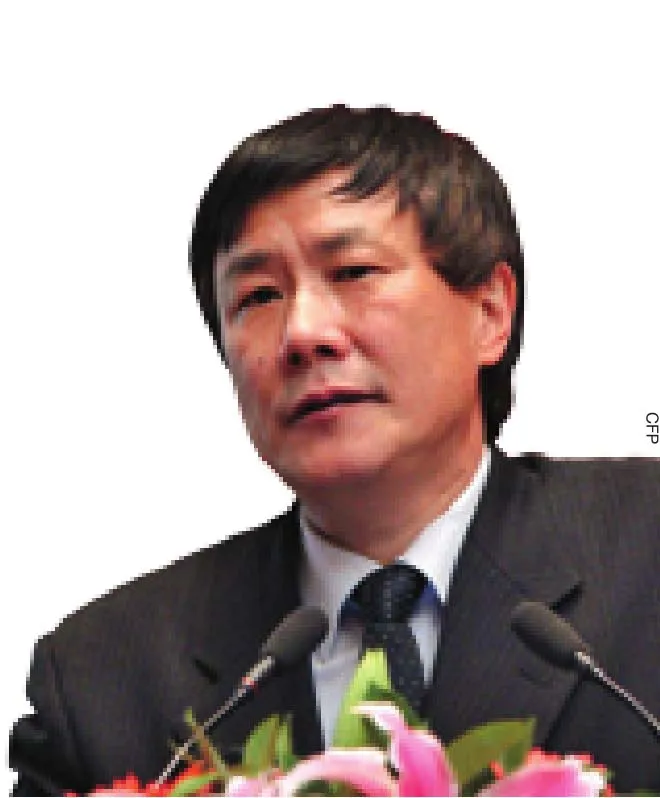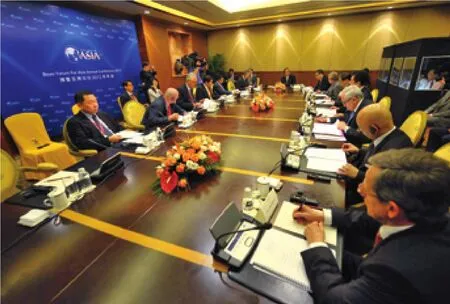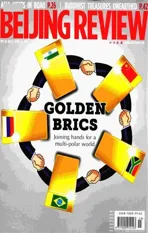Asia on the Rise
2012-10-16
Asia on the Rise

The Boao Forum for Asia (BFA) Annual Conference 2012, an economic forum attended by regional senior officials, economists and business people, was held in Hainan’s coastal resort town of Boao on April 1-3.
Zhang Yansheng, Director of the Institute for International Economics Research of the National Development and Reform Commission, talked toBeijing Reviewreporter Yu Lintao in an exclusive interview before the opening of the BFA, sharing his views on the world economy, emerging Asian economies and China’s economic issues. Edited excerpts follow:
Beijing Review: What’s the signi fi cance of the BFA? Compared with Davos World Economic Forum, what kind of role has it played in Asia?
Zhang Yansheng: In a general sense, the trend of the world economy is moving eastward to the Asian district. Developed countries are mired in slow or even negative economic growth while emerging economies,Asian countries in particular, have witnessed fast growth, according to a report by the Asian Development Bank.
The 10-year history of the BFA is in line with the economic boom in Asia in the past decade. It has played an active role in uniting Asian countries, exerting the functions of emerging economic powers and letting them shoulder more responsibilities. Moreover,it has effectively pushed forward regional economic cooperation and the economic integration of the continent.
The annual reports that the BFA releases each year, including Asian Competitiveness,Progress of Asian Economic Integration and the Development of Emerging Economies,are based on thorough analysis of Asia’s economic development trends and will offer good evidence for all countries in Asia to sustain steady economic development.
Compared with the Davos World Economic Forum, a world-class forum targeted at solving economic issues worldwide, the BFA is focused on the Asian region. Due to expanding in fl uences of the Asian economy,the BFA is playing a bigger and bigger role in the world.
How can Asian countries achieve sound and sustainable development, which is the theme of this year’s BFA?
A highly polluting and energy-depleting development mode will eventually cost us a lot. In a bid to realize healthy and sustainable development, Asian countries should improve ef fi ciency of their economic growth,from relying on high input to depending on knowledge, wisdom and innovation. Also,they should reduce their over-dependence on European and U.S. markets, explore emerging markets and expand market demand in Asia.
How do you see today’s world economy and the Asian economy?
The world economy has encountered three“lacks”: a lack of demand, a lack of confidence and a lack of methods.
To start with, major economic powers in the West are still mired in a sluggish economic recovery four years after the financial crisis in 2008. The economic stimulus methods that the United States, Japan and Europe have opted for are quite worrying, such as the quantitative easing monetary policy and the practice of printing more banknotes. These methods will drive up their domestic inflation and create a capital bubble. Worse still, these methods are likely to let a huge amount of hot money fl ock to emerging economies and push up their in fl ation levels.In the end, the global economy will face more severe in fl ation and bubble risks.
Also, Western countries mainly rely on overseas market demand to stimulate their domestic economies, which will easily result in trade frictions with other countries.
Emerging economies also face numerous dif fi culties and uncertainty. Some have fl awed economic structures and political corruption,while many others are fighting hard against poverty and striving to improve people’s lives. They feel an urgent need to transform their economic development patterns by fostering domestic demand. Rubbing salt into those wounds is the drop of global total demand because of the continuous economic downturn in developed countries, which will negatively affect the steady growth of emerging economies.
Asia is experiencing an economic integration period. Some Asian countries, such as China, used to import components from Japan and South Korea, assemble them and then export to the United States and Europe. Given the current international development trend,this should change.
First, Asian countries should expand internal demand. Asia’s economic growth should rely on investment, trade and coordination of policies among Asian countries.
Second, we should propel Asian integration to expand cooperation within the region. This requires leading powers to assume their due responsibilities and increase their mutual trust.Asian countries should adopt the principle of seeking common points while preserving differences when dealing with historical problems and bilateral disputes.
Finally, we should study how to accelerate regional technological cooperation to realize a green and low-carbon economy in Asia.
How long will the current global economic slowdown last? China lowered its GDP growth target for 2012. How will this infuence the world economy?
The annual global economic growth rate was 3.3 percent from 1980 to 1991, 3.5 percent from 1992 to 2001 and 4.5 percent from 2003 to 2007, according to the International Monetary Fund. Since 1990, there have been two imbalances for the global economy: the IT industry’s revolution and its bubble in the 1990s and the virtual economy’s upturn and downturn from 2003 to 2007.
In the future decade, we won’t see a fast economic growth worldwide because there won’t be major technological breakthroughs like the IT revolution in the next 10 years, or irrational prosperity brought about by global fi nancial bubble,just like we experienced in 2003.
China lowered its GDP growth target for 2012 to 7.5 percent, according to Premier Wen Jiabao’s Government Work Report during this year’s full session of the National People’s Congress. China’s slower growth, I think, is an inevitable trend. That’s because of the end of China’s low-cost advantage, and an irrational prosperity period and the WTO entry effect for the country.
However, as long as China can maintain its steady and sustained development, it will continue to make a huge contribution to the global economy.
China is always accused of violating foreign trade rules by the United States and other countries. How should we cope with this problem?
The main purpose for the United States to push forward globalization is that it can enjoy the bene fi ts it brings about. But now, the United States thinks globalization has gone out of its control. Hence, it hasn’t enjoyed as many bene fi ts as it had expected, and China,on the other hand, has gained a lot from globalization.
Since the financial crisis in 2008, the United States has shifted the emphasis of its policies and strategies from getting access to foreign markets to harping on the trade policies of their partners. It checks whether laborers are paid to international standards,whether there are sweatshops, whether companies have paid for pollution and whether perfect copyright protection policies have been enforced. The United States is re-establishing international trade rules according to its own rules, which ensure that 55 percent of the pro fi ts of U.S. outbound investment will go back to the United States.
China should adhere to globalization, adopt multi-lateralism and oppose any kind of trade protectionism. Meanwhile, it will actively accelerate the transformation of its development pattern and enhance overall competitiveness by adjusting its export-oriented mode and intensifying the internationalization of its talent pool,capital market and industries.
How can China make better use of its large amount of foreign exchange reserves?
China has over $4 trillion in outbound fi nancial assets, among which only 7.5 percent is outbound direct investment and $3.2 trillion, or 70 percent of the total, is in foreign exchange reserves. China needs to adjust the structure of its outbound fi nancial assets step by step. Because foreign exchange reserves can only be used for foreign trade and investment, it can be used for pushing forward the“going out” strategy of Chinese companies by supporting their global investment, production, sales and services.
Also, the reserves can be used to accelerate the transformation of domestic industrial structure and to import energy and resources badly needed by China to form its own reserves of energy and resources. Moreover, it can be used to help China improve its external environment and enhance its soft power.

ANNUAL EVENT: The Board of Directors Meeting of the Boao Forum for Asia Annual Conference 2012 was held on March 31 to make preparations for the three-day event
